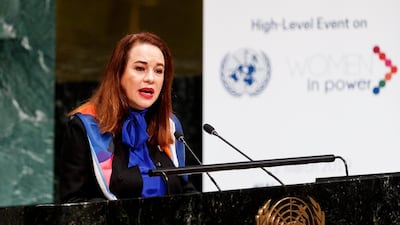There has been a "serious regression" in the position of women in governments across the world in recent years, the UN General Assembly President Maria Fernanda Espinosa said on Tuesday evening.
The latest statistics show that women account for less than 7 per cent of the world’s leaders and only 24 per cent of lawmakers, Ms Espinosa told the annual summit of women activists at UN Headquarters in New York.
“In 2015 it would have taken 30 years to close the gender gap, but if trends continue, gender equivalence will not be reached for 107 years,” said the former Ecuadorian Foreign Minister who leads the 193-member world body.
Ms Espinosa stressed the need for greater representation of women in parliaments to ensure that “reforms of discriminatory laws can be pushed forward”.
“It will also increase investment in key areas such as healthcare, education and social protection,” she said.
“We have come a long way to reduce the inequality gap between women and men. But we still have many obstacles to overcome,” Ms Espinosa said.
The UNGA president urged for greater female participation in politics from grassroots movements to higher ranks in government.
Statistics from the Inter-Parliamentary Union released last week indicated that the percentage of female elected heads of state have dropped from 7.2 per cent to 6.6 per cent from 2017 to 2018.
The fraction of female heads of government decreased from 5.7 percent to 5.2 percent in the same period.
In the Middle East and North Africa, Mauritania maintained the largest share of women ministers in the region at 31.8 per cent, with the UAE following closely at 29 per cent, according to the statistics.
“The overwhelming majority of government leaders remain male despite some positive movements,” Gabriela Cuevas Barron, head of the Inter-Parliamentary Union said during a news conference on Tuesday.
In a positive step, the global share of women increased by nearly one per cent from 2017-2018 to 24.3 percent.
But Ms Barron said that it took 25 years to get to that figure from 11 percent in 1995.
UN Secretary General, Antonio Guterres informed the high-level event that although there are obstacles, one must push back.
“We will push back against the pushbacks, and we will not give up until we reach parity across the board,” Mr Guterres said.
The increased inclusion of women in politics leads to comprehensive decisions and can change people’s image of what a leader looks like, UN Women Executive Director Phumzile Mlambo-Ngcuka told the delegates.
“We still have a steep road ahead, but the growing proportion of women ministers is encouraging, especially where we see a rise in the number of countries with gender-balanced ministerial cabinets," Ms Mlambo-Ngcuka said.


